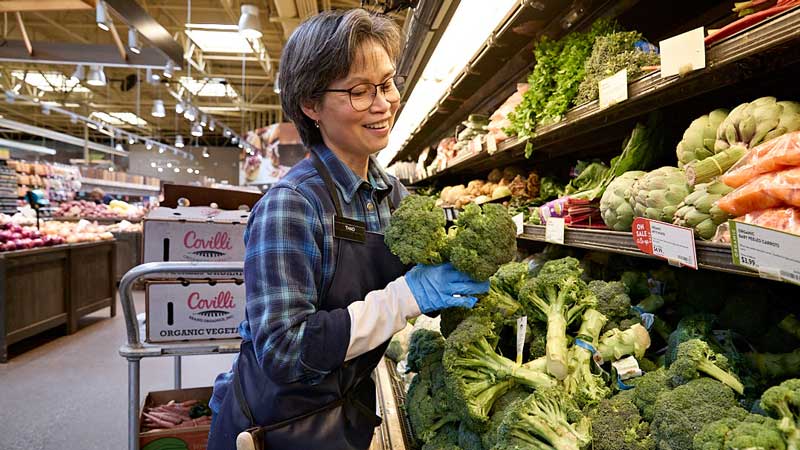New PCC Purpose Report details progress in co-op goals
This article was originally published in April 2024

In 2023, PCC recycled more cardboard, wasted less food, made its chocolate bars more sustainable and found more ways to support food systems and local communities.
Details on those goals and much more are available in Part 1 of the latest PCC Co-op Purpose Report, available here. The co-op collects and shares data each year for PCC membership detailing work on its goals and commitments. Part 1 details sustainability, sourcing, community and food systems; Part 2, on finances, will be online later this spring.
CEO Krish Srinivasan wrote in the report that “we are so proud of our team, grateful to our member-owners, humbled by the support of our suppliers and community partners, and energized by our cooperative purpose.”
He wrote, PCC remains grounded in furthering cooperative principles. “Imagine a world where your groceries do good…,” he wrote. “Our triple bottom line means that our success is your support; and your support determines our success.”
Highlights of the report include:
- PCC stores generated 21 fewer tons of garbage in 2023 compared to 2022, reflecting an overall decrease of 3%. This was achieved in part through a new partnership recycling produce boxes (see details here).
- PCC stores kept two more tons of plastic film out of landfills in 2023 than in 2022, a 5% decrease, through a partnership with distributor UNFI.
- PCC is moving to refrigeration systems that use CO2, a climate-friendly natural refrigerant, rather than synthetic refrigerants that have a very high global warming potential (GWP). Four of the co-op’s stores already have CO2 refrigerant — Ballard, Bellevue, Kirkland and West Seattle PCC.
- Natural gas usage in PCC stores decreased 5% from 2022, while electricity usage increased 1% over the same time period. See the full Purpose Report for details on PCC’s work to offset and also decrease emissions.
- Just over 1,800 tons of compost were collected from stores in 2023, a decrease of more than 300 tons from 2022. This drastic reduction was due to better data and stricter operations goals, including moves to prevent over-ordering. Reducing overordering also contributed to a drop of more than 220,000 pounds in PCC food donations; however, PCC still donated more than 1.5 million pounds of high-quality food to 37 community organizations in 2023.
- PCC recycled 29 fewer tons of material in 2023, an 8% decrease from 2022, but attributed at least part of the change to more accurate record-keeping.
- PCC worked with K’UL, the producer of its private-label chocolates, to reformulate PCC chocolate chips and bars by sourcing cacao from a farmer-based cooperative in Ghana. This significantly reduced naturally occurring lead and cadmium levels, an ongoing concern in cacao-based products, from PCC organic chocolate bars. The packaging is also now made from recycled material that is in turn recyclable through Ridwell.
- More than 80 businesses opted into PCC’s Inclusive Trade Program, which was introduced in June 2023. The new product standard is meant to increase awareness of and support for business owned by individuals who identify as members of historically and currently excluded communities. (Learn more about it here).
- After piloting a sensory-friendly shopping hour on July 26, 2023, for the anniversary of the Americans with Disabilities Act, PCC introduced a weekly Quiet Shopping Hour on Sundays in all stores (see details here).
- Other work toward creating a more inclusive co-op community included debuting a program to showcase local artists from communities in PCC stores, working directly with local organizations, and hosting staff events to gain insights into historically and currently excluded communities.
- The co-op community raised over $238,000 to benefit United Indians of All Tribes, Salmon Safe, Global Ocean Health, Growing for Good, Washington Farmland Trust, and PCC food access initiatives. These programs support everything from hunger relief efforts to salmon habitat restoration to the preservation of local farmland.
- PCC facilitated an additional $170,000 in donations through our staff, suppliers and products sold at PCC to organizations including the Center for Whale Research, Long Live the Kings and Washington Farmland Trust. (For instance, $2 from sales of every bottle of Chinook’s Long Live the Kings Yakima Valley Red or Yakima Valley White is donated to Long Live the Kings.) PCC also provided more than $161,000 in donations and sponsorships to support local and regional events and organizations.
- PCC helped Toxic-Free Future pass Washington’s Toxic-Free Cosmetics Act, which bans more chemicals of concern in beauty and personal care products than any other state or federal law. (Interested in joining some 12,000 PCC Advocates who get email alerts with calls to action on policy issues? Join our newsletter list here.)
- 9,800 new members joined PCC, bringing the co-op’s total membership to nearly 116,000 members.
PCC Purpose Reports
PCC began producing Purpose Reports in 2016. Reports from every year are available online. Part one of the 2023 report, Responsible Sourcing, Sustainable Operations, and Community and Food Systems, is available here. Part two, detailing co-op finances, will be online later this spring.

How to become a PCC member
Interested in joining the co-op? The 2023 Co-op Purpose Report also provides some membership details, including that nearly two-thirds of PCC sales come from member-owners. Learn about the many benefits of membership here, including member-only deals and events, discounts and other benefits at partner businesses… and the chance to make a difference.
A lifetime membership costs $60.
Sign Up